

“Deeper Learning” Cheat Sheet; Feel Free to Share. For two years I have been collecting notes from blogs, books, school observations, and more discussions with more educator colleagues that I can remember or cite.
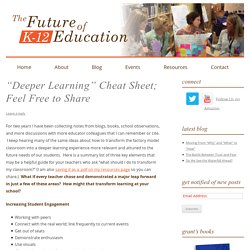
I keep hearing many of the same ideas about how to transform the factory model classroom into a deeper learning experience more relevant and attuned to the future needs of our students. LEARNING LEADING CHANGE: Blue Sky High - five things every secondary school should implement...now. So, what happens when you take 15 years of teaching and leading at four different fairly traditional, fairly engaging, high performing secondary schools, add three years of innovation incubation as part of the establishment Senior Leadership Team at Hobsonville Point Secondary School (HPSS) and throw in a bit of Most Likely to Succeed (documentary and book)?
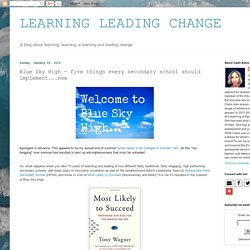
For me it's resulted in the creation of Blue Sky High. Actually, to be honest, Blue Sky High has been with me for a while now. Some people have imaginary friends, not me, I'm all about the imaginary high school. Blue Sky High isn't a new school, because to me that's not where the potential necessarily lies. Simple Rules: An Important Step in School Transformation? Learning Leading Change: Where's the research? Why we need to stop looking in the rear vision mirror at longitudinal research and data. Don't get me wrong.
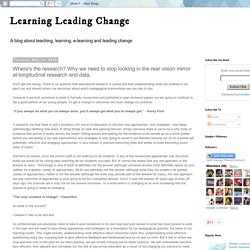
There is no question that educational research is useful and that understanding what has worked in the past can and should inform our decisions about which pedagogical interventions we use day to day. However if we limit ourselves to what is formally researched and published in peer reviewed papers we are going to continue to fail a good portion of our young people. To get a change in outcomes we must change our practice. “If you always do what you’ve always done, you’ll always get what you’ve always got.” - Henry Ford. Voice and Choice: Growing great citizens for a connected world. The following notes were the basis for my recent keynote to a large cluster of Whanganui schools, with thanks for the opportunity to speak with nearly 300 teachers.
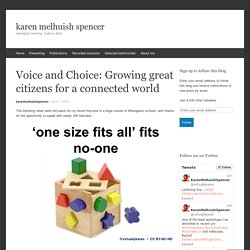
Over the past years we have become aware that ‘one size fits all’ no longer fits anyone, that the ‘industrial models’ of education – legacy thinking – are being rapidly debunked by the changing nature of society, of information, and access to current research around learning and education. Growing pressures on young people, growing inequality, huge ‘wicked problems’ in society, such as equity and environmental concerns, and growth in understanding about how we learn and can keep learning is pushing what we know about education.
The launch of AUT’s #Edgework15. “It’s in the spaces between the people, between people and ideas, and ideas and other ideas that creativity and new knowledge lie.”
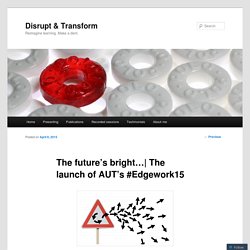
Today I attended the launch of a network – #edgework: Educational Futures Network – from AUT, an initiative convened by Prof. Finland schools: Subjects are out and ‘topics’ are in as country reforms its education system - Europe. For years, Finland has been the by-word for a successful education system, perched at the top of international league tables for literacy and numeracy.
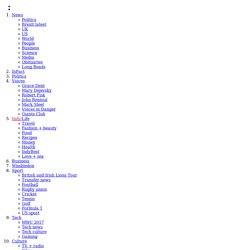
Only far eastern countries such as Singapore and China outperform the Nordic nation in the influential Programme for International Student Assessment (PISA) rankings. Politicians and education experts from around the world – including the UK – have made pilgrimages to Helsinki in the hope of identifying and replicating the secret of its success. Which makes it all the more remarkable that Finland is about to embark on one of the most radical education reform programmes ever undertaken by a nation state – scrapping traditional “teaching by subject” in favour of “teaching by topic”. FutureFocusedLearning30May2014PDF.pdf. Why Twitter Will Never Connect All Educators. If there is one thing I truly understand about educators it is that they are slow to change.

It might be from decades of people jumping in with the “latest and greatest” answer to a better way to do things in education, or some legislative mandate to fix it all through legislation, only to find it to fizzle out and fall way short when actually implemented. If teachers learned one thing from these experiences it is that, if you wait and ride it out long enough, all of these initiatives will all go away.
The problem however is that many educators want to apply this sit and wait posture to anything that requires them leaving their zones of comfort. The mindset of a 20th Century educator is very comfortable for most educators since they were trained for the most part by 20th century educators. Teacher as Farmer. K-12 education is riding the leading edge of a wave of existential transition, the kind that comes once or a few times in several generations.
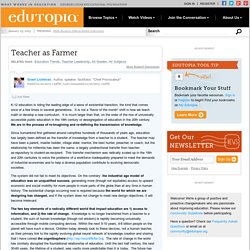
It is not a “flavor of the month” shift in how we teach math or develop a new curriculum. It is much larger than that, on the order of the rise of universally accessible public education in the 19th century or desegregation of education in the 20th century. 6 Design Principles Of Connected Learning. The Learning And Design Principles Of Connected Learning by Terry Heick In 2015, no one should be hurting for compelling ed content.
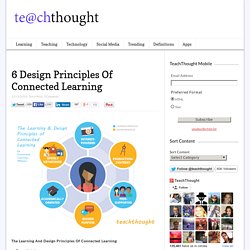
Sites like edutopia, The Tempered Radical, Langwitches, Justin Tarte, Cool Cat Teacher, Grant Wiggins’ blog, and dozens of others offer outstanding reading on a daily basis to help you improve the things that happen in your classroom. EDR-Supplement-2014. Learning with 'e's: Looking ahead. My Ideal School (But Where’s the Technology?) Recently, I made a list of what I think my perfect school would look like.
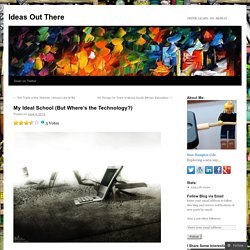
As I began developing the list, I was struck by two things: Firstly, how most of it was about making school more student-centered, and secondly, that I didn't mention technology once. For me, this second trend bears a little more fleshing out. I would never say that there is no place for technology in education, far from it… But I think the place of technology is to support a more student-focused, relevant and engaging methodology. It is the 'how', not the 'what'. For me, technology in the ideal school plays a supporting role – and it is a vital one, since my dream school relies on it to work, but it is still only there as a means to support the growth and flourishing of our students.
The specific technologies will change and evolve, but once a school has reliable and fast Internet connectivity, other technologies can grow around it. Take aim at innovation, with students in the center. In September 2012, I packed up my Prius, left my patient wife, and drove around the United States for 89 days and 10,000 miles visiting 64 schools of every flavor and size to find out how they are preparing students for a rapidly changing world. I asked questions and recorded learning with more than 600 teachers, administrators and students. In setting up the complex matrix of this trip, many of my hosts asked, “What would you like to see when you are here?” The journeys of discovery in my life have started with open goals and few preconceptions, so I left the agendas as open ended as possible, with one caveat: I was not interested in seeing a 1:1 laptop program or talking with teachers about their tablet rollouts.
It’s About Learning - Reggio-Inspired. Visible Learners focuses on how we can make deep learning experiences visible for high school students and adult learners. It is inspired by the Reggio Emilia pedagogy of listening and relationships, and grounded in the philosophy of children as capable and powerful, rather than unskilled and passive. The two key principles are group learning and documentation.
When combined, these two practices make learning visible. The following outline summarises the key practices from the book: 50 Crazy Ideas To Change Education. 50 Crazy Ideas To Change Education by Terry Heick Below are 50 ideas for a new education. Note, most of these are about education as a system rather than learning itself, but that’s okay. It’s often the infrastructure of learning that obscures anyway. Few of them may work; even fewer would work together, and that’s okay too.
Hackschooling Makes Me Happy: Logan LaPlante at TEDxUniversityofNevada. Christchurch Connected Educators: Choose to be More at Clarkville. What’s it taken to CHOOSE TO BE MORE at Clarkville? From Pene Abbie, Principal, Clarkville School. 8 Things to Look For in Today’s Classroom. As I think that leaders should be able to describe what they are looking for in schools I have thought of eight things that I really want to see in today’s classroom.
I really believe that classrooms need to be learner focused. This is not simply that students are creating but that they are also having opportunities to follow their interests and explore passions.1 The teacher should embody learning as well. Will Richardson recently wrote this in a comment on one of my recent posts on what teachers need to be like in our current day and the focus that needs to be on learning: …we need teachers who are masters at developing kids as learners who are adept at sense making around their own goals. Teachers who are focused on helping students develop the dispositions and literacies required to succeed regardless of subject or content or curriculumThis moment is all about learners having an amazing new freedom to learn, not teachers having an amazing new freedom to teach. 1. Small Change, Big Impact - Design Thinking in Action, Phase 1 - Matt Ives Matt Ives.
2 reasons to keep the ‘e’ in e-learning. The question comes up frequently in discussions related to using technologies in education: Teaching, learning and leading / Pedagogical leadership / Pedagogy and assessment / Home - Educational Leaders. Cdn.nmc.org/media/2014-nmc-horizon-report-k12-EN.pdf. The 10 Most Important Work Skills in 2020. Share this infographic on your site! <a href=" src=" alt="Important Work Skills for 2020" width="500" border="0" /></a><br />Source: <a href=" Reinventing School From the Ground Up For Inquiry Learning. This Is What a Student-Designed School Looks Like. The Independent Project/ image from Charles Tsai’s movie. My top 10 challenges to become an innovative school #revisited. A couple of years ago I wrote a post about my top 10 ideas for an innovative school, its been the most viewed post.
Although it’s not definitive, it’s helpful to have a guide that can shape strategy. What Would Be a Radically Different Vision of School? There’s no shortage of different opinions about how the education system should adapt to a shifting world and a future with unknown demands, but for the most part, only two dominant narratives of education reform have emerged.
Sugata Mitra - Charlatan or genius? Future-focused learning report. Education, schooling and the digital age. We Need Schools... Not Factories. Winner Of the TED Prize 2013 In a special edition of TEDWeekends, TED and The Huffington Post are partnering to co-premiere a talk by this year's TED Prize winner. The TEDTalk by the winner is accompanied by an original blog post, along with new op-eds, thoughts and responses from the HuffPost and TED communities. Watch the talk above, read the blog post and tell us your thoughts below. Become part of the conversation! The Sole Of A Student From Plato to Aurobindo, from Vygotsky to Montessori, centuries of educational thinking have vigorously debated a central pedagogical question: How do we spark creativity, curiosity, and wonder in children? But first, a bit of history: to keep the world's military-industrial machine running at the zenith of the British Empire, Victorians assembled an education system to mass-produce workers with identical skills.
6 Tips for Getting Started with Genius Hour. Posted 05/22/2014 2:36PM | Last Commented 02/02/2015 11:36AM. 8 Ideas That Will Permanently Break Education As We Know It. 9 Ideas Education Is Having Trouble Responding To. How Teaching Is Changing: 15 Examples. So, why we are focusing on Blended Learning at HPSS? What Every Student Needs.
Into the Future - Teaching and learning: Under the influence of Big Picture Education. Realising the Future of NZ Education - an open letter to all NZ educators (and Minister Parata)